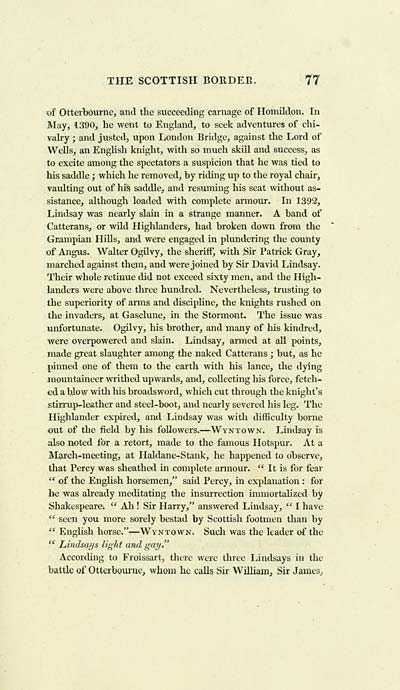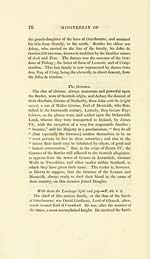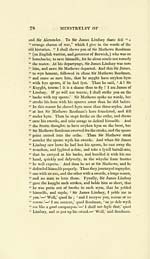Download files
Complete book:
Individual page:
Thumbnail gallery: Grid view | List view

THE SCOTTISH BORDER. 77
of Otterbourne, and the succeeding carnage of Homildon, In
May, 13D0j he went to England, to seek adventures of chi-
valry ; and justed, upon London Bridge, against the Lord of
Wells, an English knight, with so much skill and success, as
to excite among the spectators a suspicion that he was tied to
his saddle ; which he removed, by riding up to the royal chair,
vaulting out of his saddle, and resuming his seat without as-
sistance, although loaded with complete armour. In 1392,
Lindsay was nearly slain in a strange manner. A band of
Catterans, or wild Highlanders, had broken down from the
Grampian HiUs, and were engaged in plundering the county
of Angus. Walter Ogilvy, the sheriff, with Sir Patrick Gray,
marched against them, and were joined by Sir David Lindsay.
Their whole retinue did not exceed sixty men, and the High-
landers were above three hundred. Nevertheless, trusting to
the superiority of arms and discipUne, the knights rushed on
the invaders, at Gasclune, in the Stormont. The issue was
unfortunate. Ogilvy, his brother, and many of his kindred,
were overpowered and slain. Lindsay, armed at all points,
made great slaughter among the naked Catterans ; but, as he
pinned one of them to the earth with his lance, the dying
mountaineer writhed upwards, and, collecting his force, fetch-
ed a blow witli his broadsword, which cut through the knight's
stirrup-leather and steel-boot, and nearly severed his leg. The
Highlander expired, and Lindsay was with difficulty borne
out of the field by his followers. — W^yntown. Lindsay is
also noted for a retort, made to the famous Hotspur. At a
March-meeting, at Haldane-Stank, he happened to observe,
that Percy was sheathed in complete armour. " It is for fear
" of the English horsemen," said Percy, in explanation : for
l>e was already meditating the insurrection immortaUzed by
Shakespeare. " Ah ! Sir Harry," answered Lindsay, " I have
" seen you more sorely bestad by Scottish footmen than by
" EngUsh horse." — Wyntown. Such was the leader of the
" Lindsaijs light ami gay,"
According to Froissart, there were three Lindsays in the
battle of Otterbourue, whom he calls Sir William, Sir James,
of Otterbourne, and the succeeding carnage of Homildon, In
May, 13D0j he went to England, to seek adventures of chi-
valry ; and justed, upon London Bridge, against the Lord of
Wells, an English knight, with so much skill and success, as
to excite among the spectators a suspicion that he was tied to
his saddle ; which he removed, by riding up to the royal chair,
vaulting out of his saddle, and resuming his seat without as-
sistance, although loaded with complete armour. In 1392,
Lindsay was nearly slain in a strange manner. A band of
Catterans, or wild Highlanders, had broken down from the
Grampian HiUs, and were engaged in plundering the county
of Angus. Walter Ogilvy, the sheriff, with Sir Patrick Gray,
marched against them, and were joined by Sir David Lindsay.
Their whole retinue did not exceed sixty men, and the High-
landers were above three hundred. Nevertheless, trusting to
the superiority of arms and discipUne, the knights rushed on
the invaders, at Gasclune, in the Stormont. The issue was
unfortunate. Ogilvy, his brother, and many of his kindred,
were overpowered and slain. Lindsay, armed at all points,
made great slaughter among the naked Catterans ; but, as he
pinned one of them to the earth with his lance, the dying
mountaineer writhed upwards, and, collecting his force, fetch-
ed a blow witli his broadsword, which cut through the knight's
stirrup-leather and steel-boot, and nearly severed his leg. The
Highlander expired, and Lindsay was with difficulty borne
out of the field by his followers. — W^yntown. Lindsay is
also noted for a retort, made to the famous Hotspur. At a
March-meeting, at Haldane-Stank, he happened to observe,
that Percy was sheathed in complete armour. " It is for fear
" of the English horsemen," said Percy, in explanation : for
l>e was already meditating the insurrection immortaUzed by
Shakespeare. " Ah ! Sir Harry," answered Lindsay, " I have
" seen you more sorely bestad by Scottish footmen than by
" EngUsh horse." — Wyntown. Such was the leader of the
" Lindsaijs light ami gay,"
According to Froissart, there were three Lindsays in the
battle of Otterbourue, whom he calls Sir William, Sir James,
Set display mode to: Large image | Transcription
Images and transcriptions on this page, including medium image downloads, may be used under the Creative Commons Attribution 4.0 International Licence unless otherwise stated. ![]()
| Early Gaelic Book Collections > J. F. Campbell Collection > Minstrelsy of the Scottish border > Volume 1 > (279) |
|---|
| Permanent URL | https://digital.nls.uk/80611674 |
|---|
| Description | Vol. I . |
|---|---|
| Shelfmark | Cam.2.d.17 |
| Additional NLS resources: | |
| Attribution and copyright: |
|
| Description | Volumes from a collection of 610 books rich in Highland folklore, Ossianic literature and other Celtic subjects. Many of the books annotated by John Francis Campbell of Islay, who assembled the collection. |
|---|
| Description | Selected items from five 'Special and Named Printed Collections'. Includes books in Gaelic and other Celtic languages, works about the Gaels, their languages, literature, culture and history. |
|---|

